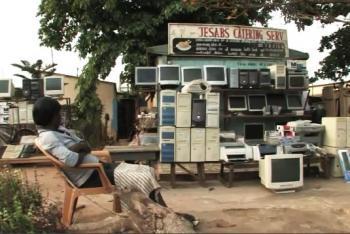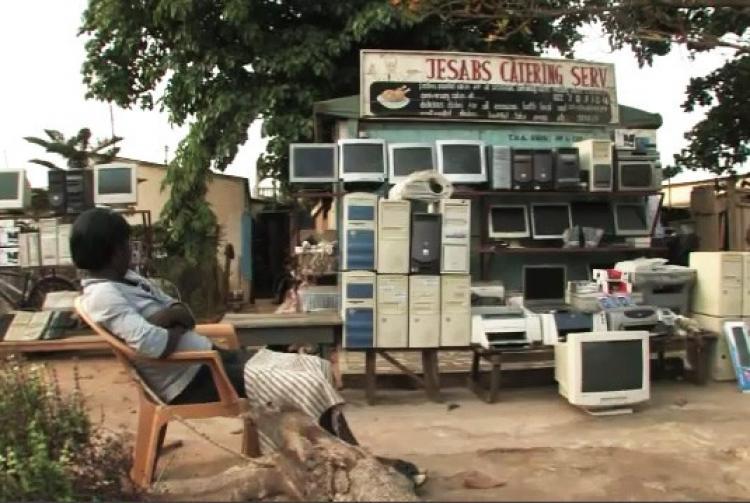VANCOUVER—A team of University of British Columbia journalism students who traveled to Ghana to investigate electronic waste for a reporting course accidentally discovered a sensitive U.S. security breach.
One of the students bought several hard drives from e-waste dealers at an open-air market in Ghana—home to one of the world’s largest digital dumping grounds—for the equivalent of $40.
One of the drives contained sensitive information about a $22-million defence contract between the Pentagon, Department of Homeland Security, and Northrop Grumman, one of the largest military contractors in the United States.
The other drives turned out to contain intimate details of people’s lives, family photos, and private financial data such as credit card numbers, account numbers, and records of online transactions.
Such information could easily have been misused—especially in a country listed by the U.S. State Department as one of the top ten sources of cybercrime in the world.
“We had the drives analyzed after leaving Ghana and were surprised at what we found,” said UBC Associate Professor Peter Klein in a news release. Klein, an Emmy Award-winning former 60 Minutes producer, is one of the three instructors of the course.
According to the team’s investigation, the FBI is concerned that companies such as Northrop Grumman probably believe their drives are wiped clean by software before being recycled. Northrop Grumman is currently looking into how its hardware and information ended up in West Africa.
Klein said that a “parachute journalist” probably wouldn’t have been able to ferret out such a story.
“The reason the students discovered this security breach is that they took the time to go see for themselves what’s going on, without pre-conceived ideas of the story, and they did some amazing enterprise reporting.”
Agbogbloshie, a shanty town in Accra, Ghana, has become one of the world’s digital dumping grounds where hundreds of millions of tons of electronic waste ends up each year.
The students, who traveled to three countries to do their research, made a documentary named Ghana: Digital Dumping Ground. The film is a pilot production resulting from a $1-million donation by Vancouver philanthropist Alison Lawton to UBC’s Graduate School of Journalism.
The donation launched Canada’s first International Reporting course to send journalism students abroad to cover important and under-reported issues.
Ghana: Digital Dumping Ground airs on PBS on June 23 as well as online at http://www.pbs.org/frontlineworld/stories/ghana804/video/video_index.html
One of the students bought several hard drives from e-waste dealers at an open-air market in Ghana—home to one of the world’s largest digital dumping grounds—for the equivalent of $40.
One of the drives contained sensitive information about a $22-million defence contract between the Pentagon, Department of Homeland Security, and Northrop Grumman, one of the largest military contractors in the United States.
The other drives turned out to contain intimate details of people’s lives, family photos, and private financial data such as credit card numbers, account numbers, and records of online transactions.
Such information could easily have been misused—especially in a country listed by the U.S. State Department as one of the top ten sources of cybercrime in the world.
“We had the drives analyzed after leaving Ghana and were surprised at what we found,” said UBC Associate Professor Peter Klein in a news release. Klein, an Emmy Award-winning former 60 Minutes producer, is one of the three instructors of the course.
According to the team’s investigation, the FBI is concerned that companies such as Northrop Grumman probably believe their drives are wiped clean by software before being recycled. Northrop Grumman is currently looking into how its hardware and information ended up in West Africa.
Klein said that a “parachute journalist” probably wouldn’t have been able to ferret out such a story.
“The reason the students discovered this security breach is that they took the time to go see for themselves what’s going on, without pre-conceived ideas of the story, and they did some amazing enterprise reporting.”
Agbogbloshie, a shanty town in Accra, Ghana, has become one of the world’s digital dumping grounds where hundreds of millions of tons of electronic waste ends up each year.
The students, who traveled to three countries to do their research, made a documentary named Ghana: Digital Dumping Ground. The film is a pilot production resulting from a $1-million donation by Vancouver philanthropist Alison Lawton to UBC’s Graduate School of Journalism.
The donation launched Canada’s first International Reporting course to send journalism students abroad to cover important and under-reported issues.
Ghana: Digital Dumping Ground airs on PBS on June 23 as well as online at http://www.pbs.org/frontlineworld/stories/ghana804/video/video_index.html






